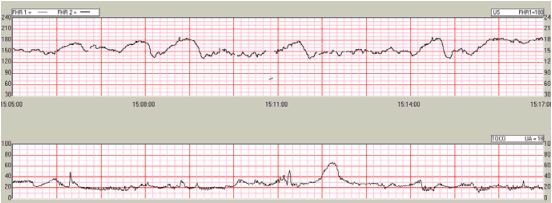The Nonstress Test (or NST) is a way to check baby’s health, in which we perform monitoring of baby’s heart rate and of uterine contractions for an hour or so. The pattern of baby’s heartbeat can give important reassurances about baby’s health.

The Nonstress Test is sometimes used on a one‐time basis (for example, if Mom does not feel that the baby is moving normally). The Nonstress Test may also be used for ongoing monitoring of baby’s health. For example, if Mom has health problems such as diabetes or high blood pressure, or is carrying twins, then there is an increase in the chance of stillbirth.
How can we reduce the chance of stillbirth? Baby’s activity pattern, the amount of fluid around the baby, and the baby’s growth are all important indicators of good health. Studies have shown that twice a week nonstress testing and amniotic fluid checks reduce the risk of stillbirth in high risk pregnancies to levels comparable to those of low risk pregnancies!
If you are having nonstress tests because of a high risk condition:
- You should be doing daily KICK COUNTS using a kick count sheet. (If you do not have one, please ask!)
- You should have nonstress test appointments twice a week, no more than 4 days apart. (Usually Monday/ Thursday or Tuesday/ Friday).
- The Nonstress Tests might be scheduled at the hospital or in the office.
- If you are unable to keep an appointment for a Nonstress Test, please call and try to reschedule for later the same day. If this is not possible, please GO TO THE HOSPITAL TRIAGE ROOM FOR MONITORING.
If you have any questions about why the Nonstress Tests are being recommended or about the results from your test, please ask!
